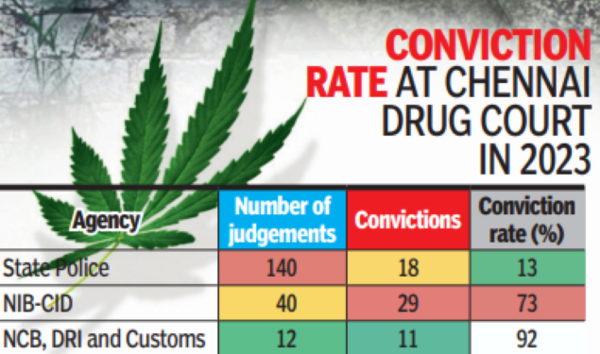The arrest of Jaffer Sadiq last week by the NCB in a narcotics case had the opposition targeting the DMK. State
police
chief Shankar Jiwal held a presser and said that in the past two years 51 tonnes of narcotics had been seized and more than 29,700 suspects arrested, including 1,800 in Chennai.
But TOI found that the
conviction rate
is only about 13% in the 140 cases filed by the state police that were decided in Chennai in 2023, against the national average of 79%. Even the conviction rate for the rest of the state is 78%. The Narcotics Control Bureau (NCB) and Customs also had a 92% conviction rate in 2023 at Chennai’s special
NDPS Act
court.

So why have the police in Chennai, Avadi, Tambaram, and Kancheepuram failed to match this. We list some of the reasons why judges have thrown out the cases:
RATS ATE IT | A man was arrested with 1.1kg of
ganja
at New Washermanpet in Feb 2019. When the court asked for the
seized narcotics
a year later, police said rats had eaten them. The man was freed. Also in 2019, Guindy police arrested a man with 1.2kg ganja near Velachery.
When the judge asked where the seized ganja was, police said it was lost when the police station was relocated in Oct 2020. The court acquitted the man. In some cases, police have told court they don’t know where the seized drugs were. Police sources said these are sometimes accidentally discarded during annual cleaning for Pongal or New Year.
RAIN DAMAGE | On Jan 30, 2017, police from Fort station seized ganja from a suspect in Royapettah. Nearly four months later, asked where the seized ganja was, Sub-Inspector Dhayalamoorthi cited rain damage as the reason. India Meteorological Department data, however, showed no rainfall in Chennai from Feb to April of that year. There was no conviction without seized material.
QUANTITY CONUNDRUM | In half of thecases that resulted in acquittals, police reported the seized ganja as 1.1kg or 1.2kg. The NDPS Act mandates a minimum ten-year sentence and up to 1 lakh fine for seizures over 1kg. Advocate P Balaji, specialising in NDPS cases, says regardless of the actual amount seized, police routinely list it as 1.1kg or 1.2kg. So where is the rest of the stuff going?
TAMPERING: Several people with criminal records have been acquitted because cow or horse dung had been added to the ganja seized to compensate for shortfall in weight. For example, ‘Kakkathoppu’ Balaji was caught with 24kg of ganja. At the trial, his defence requested a chemical analysis, saying the substance wasn’t pure ganja. The test proved him right and Balaji was acquitted as, under the NDPS Act, adulterated samples do not qualify as ganja.
COPY-PASTED FIRs | Police mechanically copy-pasted first information report (FIR) and even chargesheet details without verifying the accused’s gender, the arrest count, or the vehicles involved. They later try to correct with whiteners or black pens resulting in case dismissals. For instance, Royala Nagar police detained a single 20-year-old man with 1.1kg of ganja. However, Sub-inspector Thanush Kannaki referred to the accused in plural form as ‘Andha Nabargal koorinargal’ (‘They said’). Special Judge Juliet Pushpa noted, “The document was prepared without due consideration, given only one individual was implicated,” resulting in the man’s
acquittal
.
CONTRADICTIONS BY COPS | Officers from the same station often contradict each other on details such as seized quantities, identity of accused, locations, and vehicles. This results in aquittals. For example, at Sathangadu, a 24-year-old was arrested for selling 1.2kg of ganja. Subinspector Sekar claimed the arrest was at 2pm on Sept 14, 2019, but Inspector Rangasamy and the arrest memo listed it as 3.15pm. This man walked free.
FIVE-MINUTE PROCEDURE MYTH | Inspector Vadivukkarasi intercepted a man from Kerala at Chennai Central Railway Station at 2.10pm on April 30, 2022. According to her, by 2.15pm, her team had issued a search notice, seized 2.5kg of ganja, extracted 50 grams for sampling,packed it separately, and arrested him. Judge T Ambika deemed such a timeline highly improbable, leading to the man’s acquittal.












 English (US) ·
English (US) ·